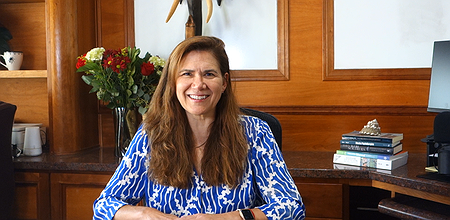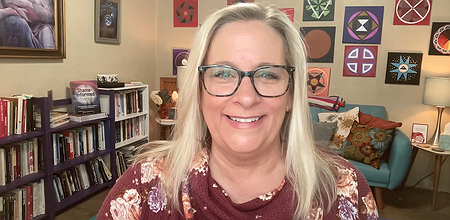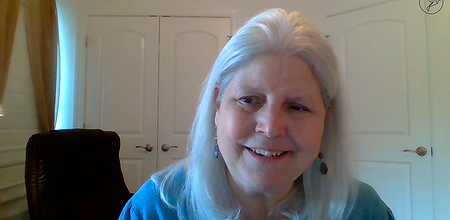- Describe the relationship between early attachment trauma and alienation from self and recognize clinical signs of self-alienation
- Transmit to the clients how to mindfully notice their distressing emotions and impulses as communications from child ego states
- Describe hypnotic and somatic interventions that create an increased somatic sense of connection or attachment to one’s self
- Foster earned secure attachment’ as the outcome of attachment bonding between adult and child selves
Healing the Fragmented Selves of Trauma Survivors: Overcoming Self-Alienation
Dr. Janina Fisher, Psychologist
Explore the therapeutic power of fostering secure attachment for clients with disowned selves
Excerpt: defensive stategy of trauma survivors
- 6h of continuing education
- 24 lessons that last from 5 to 15 minutes each
- 1 certificate of achievement
- 1 bibliography
- 1 course evaluation
- 7-day money back guarantee
- Unlimited access
- 96% of participants who completed the satisfaction survey declare they would recommend this course to a colleague
Overview
Alienation from self in the context of abusive parenting is a survival strategy that maintains children’s attachment to caregivers by disowning themselves as “bad” or “unlovable.” This deeply painful failure of self-acceptance results in lifelong shame and self-loathing, difficulty self-soothing, and complications in relationships with others. Without internal compassion and a sense of worth, it is difficult to take in the compassion and acceptance of others.
To overcome this alienation from self, therapy must focus on cultivating clients’ mindful awareness of their disowned selves and disowned experience. As clients discover their trauma-related, structurally dissociated younger selves and bring them “home,” they spontaneously begin to feel an internal sense of warmth and safety that changes their internal experience.
In this workshop, using strategies inspired by Structural Dissociation theory, Sensorimotor Psychotherapy and Internal Family Systems, you will explore the therapeutic power of fostering internal secure attachment to clients’ most deeply disowned selves. You will learn to:
- Describe the relationship between early attachment or trauma and alienation from self ;
- Recognize signs of disowned parts and their internal conflicts ;
- Identify parts that sabotage self-compassion or self-acceptance ;
- Describe interventions that create an increased somatic sense of connection or attachment to the body or the parts ;
- Capitalize on interpersonal neurobiology to increase the effectiveness of therapeutic interventions ;
- Foster "earned secure attachment" as the outcome of attachment bonding between adult and child selves.
About the expert

Dr. Janina Fisher, psychologist, is a licensed Clinical Psychologist and Instructor at the Trauma Center, an outpatient clinic and research center founded by Bessel van der Kolk.
Known for her expertise as both a therapist and consultant, she was also formerly president of the New England Society for the Treatment of Trauma and Dissociation, an EMDR International Association Credit Provider, a faculty member of the Sensorimotor Psychotherapy Institute, and a former instructor at Harvard Medical School.
Dr. Fisher has been an invited speaker at the Cape Cod Institute, Harvard Medical School Conference Series, the EMDR International Association Annual Conference, University of Wisconsin, University of Westminster in London, the Psychotraumatology Institute of Europe, and the Esalen Institute. She has authored numerous publications, including such books as Healing the Fragmented Selves of Trauma Survivors: Overcoming Internal Self-Alienation; Transforming the Living Legacy of Trauma: A Pathway to Healing for Survivors and Therapists; and Sensorimotor Psychotherapy: Interventions for Trauma and Attachment. Dr. Fisher lectures and teaches nationally and internationally on topics related to the integration of research and treatment and how to introduce these newer trauma treatment paradigms in traditional therapeutic approaches.
Learning objectives
Learning material
This workshop includes theory as well as clinical examples. It includes videos ranging from 5-15 minutes in length.
Syllabus
-
Alienation from self as a survival strategy in the context of abuse
- 1. Alienation from self
- 2. Internal attachment styles
- 3. Manifestations of self-alienation
- 4. Self-alienation and brain
-
Fragmentation and splitting as an adaptation to trauma: the Structural Dissociation model
- 5. Dissociation structure (part 1)
- 6. Dissociation structure (part 2)
- 7. Defensive strategy
- 8. Alienated parts
- 9. Question session #1
-
Mindfulness-based techniques for ‘befriending’ dis-owned aspects of the self
- 10. Relationship to self
- 11. Language of parts
- 12. Mindfulness to fragmented system
- 13. Video clip #1
- 14. Question session #2
-
Developing attunement and empathy for one’s traumatized parts, facilitating internal dialogue skills
- 15. Who is I
- 16. Mindful unblending
-
Using internal dialogue techniques to repair the emotional wounds of child parts
- 17. Practice unblending
- 18. Relationships with parts
-
Healing the wounds of childhood through reparative experiences and fostering “earned secure attachment”
- 19. From alienation to attachment
- 20. Question session #3
- 21. Protocol for work with parts
- 22. Befriending questions
- 23. Repair of internal attachment
- 24. Video clip #2
- Bibliography
CE Credits
Download a certificate of successful completion.
Audience
This training is intended for mental health professionals.
Your comments
"Loved this course - it offered a very intuitive way to integrate parts work into practice using language the client understands. I would love more trainings from this speaker!" (automatically translated)
A psychotherapist
"This course was excellent, an provided me with useful tools to assist my clients who are going through a trauma. The expert was knowlegeable, and the soft voice was a welcome extra. BRAVO!" (automatically translated)
A psychotherapist (Canada)
Registration
Ask a question
Do you have a question? Then email us at contact@asadis.net
Frequently asked questions
-
Is there an evaluation at the end of the course?
To validate the achievement of the learning objectives, a final evaluation in the form of true/false questions is required. It must be completed in order to obtain the certificate of completion.
In addition, an optional self-assessment is offered at the beginning and end of the course, allowing you to measure your progress on the targeted skills.
These evaluations are not graded and are intended primarily to support your professional reflection.
-
I have a disability. Can I receive specific support?
Yes! This training is offered as a pre-recorded video format, without subtitles. If you have a disability, we can provide an adapted alternative (technical assistance for viewing or individual supervision). For any request, please contact our disability coordinator at the following address: contact@asadis.net
-
How long do I have access to the course?
After your registration, the course is accessible anytime and from anywhere with unlimited access.
-
When does the course start?
That is entirely up to you! When you buy a course, you'll receive an access link that you can activate when you want.
-
Is there a student rate?
Yes there is! To learn more, email us at contact@asadis.net.
You may also be interested in:
Legal notice
The courses offered by ASADIS are accredited by different professional organisations. In addition, ASADIS is approved by the Canadian Psychological Association to offer continuing education for psychologists. ASADIS maintains responsibility for the program.
The CPA’s approval of an individual, group, or organization as a CE Sponsor or Provider is restricted to the activities described in the approved application or annual report form. The CPA’s approval does not extend to any other CE activity the Sponsor or Provider might offer. In granting its approval, the CPA assumes no legal or financial obligations to Sponsors, Providers, or to those individuals who might participate in a Sponsor or Provider’s CE activities or programs. Further, responsibility for the content, provision, and delivery of any CE activity approved by the CPA remains that of the CE Sponsor or Provider. The CPA disclaims all legal liability associated with the content, provision, and delivery of the approved CE activity.




